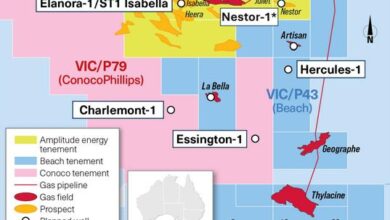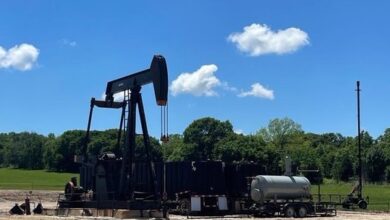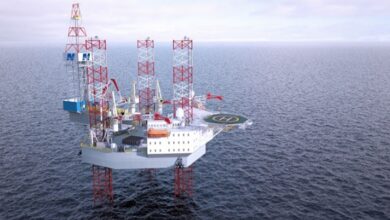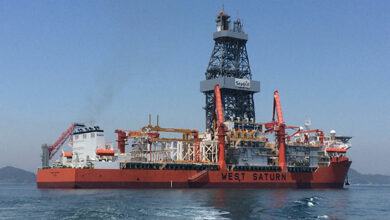Douglas-Westwood: Angola, Nigeria, Algeria key countries to lead African production growth
By Linda Hsieh, Managing Editor

Angola and Nigeria will continue to dominate the West African drilling market even as Equatorial Guinea and Ghana emerge as major deepwater players in the coming years, Douglas-Westwood Researcher Matt Cook said at the 2014 IADC Drilling Africa Conference in Paris on 1 October. In North Africa, Algeria and Egypt will support production growth despite turmoil elsewhere, he added. Overall on the African continent, “we’re expecting strong growth in both onshore and offshore well completions, with production growing to around 15 million barrels a day equivalent by 2020, which is up around 2-3 million from present day,” Mr Cook said.
In West Africa, deepwater will continue to drive production growth. Last year, deepwater production (greater than 500-m water depths) accounted for 38% of the total. That’s nearly as much as onshore production, which accounted for 44% of the total, Mr Cook pointed out. “This is primarily from Angola and Nigeria. These nations remain dominant and will be joined by Equatorial Guinea and Ghana… We’re quite optimistic about growth in these countries,” he continued.
Angola, in particular, has a robust outlook, with 2017 forecast to be a very busy year due to the TOTAL-operated ultra-deep Kaombo development. “Angola will probably be the offshore jewel in the African crown, with 200 trees to be installed from now to 2020,” Mr Cook said. “With 29 wells alone (in Kaombo), along with a host of other projects in the medium term, we see drilling sustained at much higher levels than previously seen in the last 10 years.” Douglas-Westwood forecasts Angola’s oil production to climb from 2.2 million bbl/day in 2014 to 2.4 million bbl/day in 2020.
Growth is also expected in Nigeria after a decline in onshore and swamp drilling from 2006-2009 due to conflicts in the Niger Delta. Since then, “there’s been a stagnation in drilling. But with the new Petroleum Industry Bill, we’re expecting strong growth – an average 10% per year in well completions,” Mr Cook said. By the end of the decade, Douglas-Westwood expects approximately 80 onshore wells and 80 offshore wells to be drilled per year in Nigeria.
Oil theft, however, continues to be a significant challenge, taking away approximately 10% of total production each year. “One problem that Nigeria needs to overcome is the illegal bunkering of oil, which over the last few years has accounted for around 300,000 to 400,000 barrels of oil being stolen,” Mr Cook said.
In East Africa, he highlighted Mozambique as a potential sleeping gas giant, where exploration has escalated rapidly since just the early parts of last decade. “We saw 38 exploration wells drilled in just a few offshore blocks over the last four years. By the end of the decade, 97 more exploration wells will be drilled, and that’s not even taking into account the 80 subsea wells that will be drilled by ENI and Anadarko.”
Those wells are being planned to support ENI’s ambitious floating gas project; the operator is planning four FLNG facilities on the Area 4 block. “With Mozambique’s excellent geographical location (to gas markets in Asia) and reserves, which went from 4.5 tcf to 100 tcf this year, we expect the potential is excellent for an LNG hub,” he explained.
Looking to North Africa, onshore is where most growth will take place, with 83% of wells drilled and 76% of production to be onshore through 2020. Rocked by the Arab Spring and civil wars over the past three to four years, the region has seen fluctuating oil production, particularly from Libya and Sudan. Gas output from Algeria and Egypt, however, have partly made up for that decline, Mr Cook said.
“Algeria has been a cornerstone in North African production… We’re expecting this significant exporter to keep going, especially with demand from Europe.” The country’s reserves are estimated at 12.2 billion bbl of oil and 159 tcf of gas. Douglas-Westwood forecasts 551 gas wells will be drilled in this country from 2014-2020 and that gas output will climb from 1.6 million boed this year to 1.8 million boed by decade’s end.
The country is also key to Africa’s shale development, Mr Cook said, noting that Algeria ranks third in the world for technically recoverable shale gas reserves – at 707 tcf, according to the US Energy Information Administration. “Algeria, in our opinion, is the No. 1 choice to look out for. It is a serious contender for significant shale production in the future.”
Two key challenges must be overcome, however: water scarcity, which must be addressed through technology, and security. “Following the attack on the In Amenas gas plant last year, Statoil had to pull out of that facility and is now just about to start up operations again,” Mr Cook said. “Another incident such as that tragic incident last year could see investor confidence gone permanently.”




